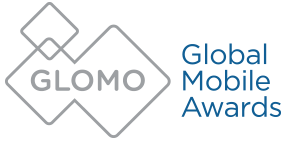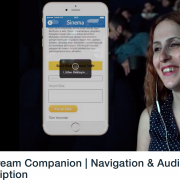Global Mobile Awards 2018: Will Turkey's accessibility efforts triumph again?
Robin Christopherson | 22 Feb 2018Since 2016 I have been fortunate to be a regular judge in the category of 'Best Use of Mobile for Accessibility & Inclusion' for the GloMos (Global Mobile Awards) at the Mobile World Congress (MWC) held in Barcelona. This year, 2018, the Mobile World Congress commences next week 26 Feb - 2 Mar, and as always I look forward to seeing the best advances in this space.
 The category I'm judging is described as an "award (that) recognises innovation in the vital development of mobile products, applications, services, devices and other initiatives and projects that enhance accessibility and inclusivity for billions of people afflicted with disabilities, both physical and mental impairments, as well as older users."
The category I'm judging is described as an "award (that) recognises innovation in the vital development of mobile products, applications, services, devices and other initiatives and projects that enhance accessibility and inclusivity for billions of people afflicted with disabilities, both physical and mental impairments, as well as older users."
I'm not sure about the word 'afflicted', but nevertheless there's no mistaking MWC's commitment to this important area of mobile - an area which in reality impacts every user who squints at their screen, juggles their phone one-handed or endeavours to use an app whilst distracted by the busy environment around them. We’re all, in very real terms, disabled on a daily basis when it comes to using our mobile phones.
2017 Best Use of Mobile for Accessibility & Inclusion winner
In my three years of judging we've seen some exceptional entries from a wide selection of countries and continents. It would seem, however, that Turkey stands out in the number and quality of their mobile-focused inclusivity initiatives. In particular, Turkey's telecoms industry is a hotbed of competition with rival providers trying to outdo each other in helping their disabled customers. Oh I wish it were the same here in the UK.
Last year's overall winner in the accessibility and inclusion category was Turk Telekom (also known as Avea) for their Loud Steps app that assists visually-impaired and blind users with indoor mobility through the smart use of existing beacon technology. Here's a short video about the app:
Here's how they describe their entry, which uses inexpensive mainstream bluetooth beacons:
"The Loud Steps application, which is designed to enable visually impaired people to walk in indoor spaces without need for help, aims at supporting them to mingle in social life. Together with its technological infrastructure, the Loud Steps application features a first in the world, where it can be used by all visually impaired people independent of the operator. The application is planned to be used in public areas such as airports and hospitals. Until today, 15,000 people downloaded the Loud Steps application."
As well as Loud Steps, Turk Telekom has also produced a large number of products and services with a focus on accessibility – a really exceptional effort to assist disabled people across Turkey and further afield.
2016 winner Best Use of Mobile for Acessibility & Inclusion winner:
In 2016, rival Turkish telecoms company Turkcell won this category for their My Dream Companion app for blind movie-goers. Adding audio description (an additional spoken track that describes the action on-screen) for visually-impaired visitors, this app was previously recognised in 2014 Global Mobile Awards following its launch.
The application, which was developed by Turkcell and the Young Guru Academy, also provides access to current news, more than 100 columnists’ daily columns, thousands of audio-books, training programs, magazines, indoor navigation services and practical information including weather and exchange rates.
Amazon Echo wins Disruptive Device Innovation Awards
Last year’s winner of the ‘Disruptive Device Innovation Award’ was Amazon for the Amazon Echo. Did I ever mention that I have a daily podcast covering Alexa skills? We will definitely look back at 2017 as the year when smart voice assistants landed in many homes and hearts. For millions of disabled people they represent true utility, where so many other options are often far more effort and far less accessible.
The 2017 best overall mobile app (Judge’s Choice) went to Niantic Inc. for Pokémon Go - an honour that went to Google for Google Cardboard the previous year. These winners use augmented reality (AR) and virtual reality (VR) – both AR and VR being areas ripe with potential to assist those with a range of impairments and the subject of an article for another day – and there’s no question that we should watch this space very carefully in 2018.
One other notable winner – last year ‘Best use of mobile for travel, leisure & hospitality’ award went to what3words for 3 word addresses. What are three word addresses? Well I’m currently sitting at carry.sailor.shapes which is an exact 3m x 3m location. The whole world has been divided into such squares and an address which is easy to remember and so precise to locate that it is proving revolutionary in many parts of the globe where more conventional addresses are unusual or unusable.
If you’d like to find out what three word address you’re currently sitting in, why not use their world mapping website. What3words (and their accompanying app) were also recognised for this groundbreaking approach to addressing in AbilityNet’s Tech4Good Awards.
Robin Christopherson is head of digital inclusion at AbilityNet. You can see a full list of Robin's blogs, here.



